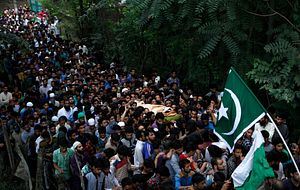For the second successive summer, a Hizbul Mujahideen (HuM) commander has been taken down by the security forces in Indian-administered Kashmir. Sabzar Bhat was killed in a police raid along with other suspected militants on Saturday morning.
The killing of Bhat’s predecessor, Burhan Wani, had Kashmir up in arms last year, as the region experienced one of the worst sustained episodes of violence in the state.
India-Pakistan ties, which had briefly experienced the high of Prime Minister Narendra Modi’s stopover at Lahore only seven months before Wani’s killing, have retraced their nadir since then, with threats of a nuclear war emanating last year as well. Pakistan’s support for militants in Indian-administered Kashmir is a key cause of the current chill.
Pakistan’s backing of HuM is well documented. The militant group was formed in Pakistan-administered Kashmir in 1989, with the help of the Inter-Services Intelligence (ISI) and the Jamaat-e-Islami (JI), a mainstream Islamist party, to counter the narrative of Jammu and Kashmir Liberation Front (JKLF), which had been fighting for an independent state and not a merger with Pakistan.
Following 9/11, and more recently the Mumbai attacks, Islamabad has had to be more careful in owning Kashmir-bound militant groups, with the General Pervez Musharraf regime banning the likes of Lashkar-e-Taiba (LeT) and Jaish-e-Muhammad (JeM). LeT, JeM, HuM, and at least 10 other militant groups form the United Jihad Council, which is dedicated to Islamization of the freedom struggle, and establishment of union with Pakistan as the official Kashmiri stance.
Following last year’s Pathankot attack, which the UJC and HuM head Syed Salahuddin claimed, Pakistan had vowed action against the perpetrators. A couple of weeks following the Pathankot attack, Salahuddin addressed a news conference at the press club of Muzzafarabad – the capital of Pakistan-administered Kashmir – issuing direct threats to Islamabad for the crackdown against JeM.
The UJC openly holds press conferences and organizes jihadist meetups in Muzzafarabad. Many of these have been chaired by former ISI chiefs, who have supervised jihadist camps in Pakistan-administered Kashmir. Rebranding them as the UJC has facilitated Pakistan’s maintenance of support for the militant groups it banned in the 2000s.
This duplicitous stance and action against jihadist groups is now notoriously dubbed as the “good Taliban, bad Taliban” policy, where Pakistan discriminates between groups motivated by similar ideologies and goals, allowing many of them to sustain themselves within its borders in order to chase Islamabad’s ambitions in Kashmir and Afghanistan.
Over the past decade this differentiation has boomeranged, with Pakistan losing over 60,000 citizens to jihadist terror fueled by the radical Islamist ideology that the state has taught in schools and madrassas alike. This has meant that Islamabad has continued to fail, or refuse, to acknowledge how the Kashmir-bound groups have overlapped with the jihadist militia in South and Central Asia, many of whom are formally at war with Pakistan.
The Islamization of Kashmir’s erstwhile nationalist freedom fight has meant that there are few supporters of the cause at the international level, with Islamabad often alone in taking up the matter at the United Nations. At a time when 223 resolutions have been passed against Israel alone in the past decade for its occupation of Palestinian territories, thanks in large part to Pan-Arab lobbying, the fact that none of the Muslim states are supporting Kashmiris reflects the abject failure of the Islamist transformation of the freedom movement.
Meanwhile, Islamabad’s solitary voice for Kashmir has dented the struggle more than anything, considering the universal accusations against Pakistan of fueling jihadism, which has coincided with the ideological metamorphosis of the Kashmiri fight.
At a time when Pakistan is being forced into arresting Hafiz Saeed, the head of all Kashmir-bound militant activities, and when reports of civilian leadership asking the military to stop shielding the heretofore “good” jihadists have become a national scandal, Islamabad has little choice but to abandon jihadism in Kashmir.
This is especially true as China, which has provided Islamabad a route to financial sustenance through the much peddled China-Pakistan Economic Corridor, has repeatedly asked Pakistan to cleanse the state of radical Islamism so that CPEC can reach its full potential.
For Kashmir, the recent statement of former HuM commander Zakir Musa that he’d “behead” Hurriyat leaders for suggesting that the struggle was a “political movement” highlights the extremes to which the freedom fight has been infested with ideas that contradict the very human rights that Kashmiris demand for themselves.
Musa’s struggle for an Islamic state might have been gorier and blunter than other HuM leaders, prompting his exit from the group, but Burhan Wani – like other HuM leaders – was equally vocal about establishing an Islamic caliphate in “Kashmir and beyond.”
With “moderate” Riyaz Naikoo being made the new HuM commander, for damage control purposes following Musa’s proclamations, unless the Kashmiri groups disassociate their struggle – militant or otherwise – from radical Islam, they’re going to find little support from a world that is collectively reeling from a global jihadist surge.
If Pakistan is at all interested in freedom for Kashmiris it should stop backing the movement based on religious affiliations and rally for it on humanist and nationalist grounds. But for that to happen, Islamabad would have to abandon its own jihadist militia, and the Islamist totalitarianism in Pakistan-administered Kashmir.

































